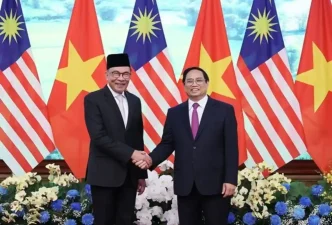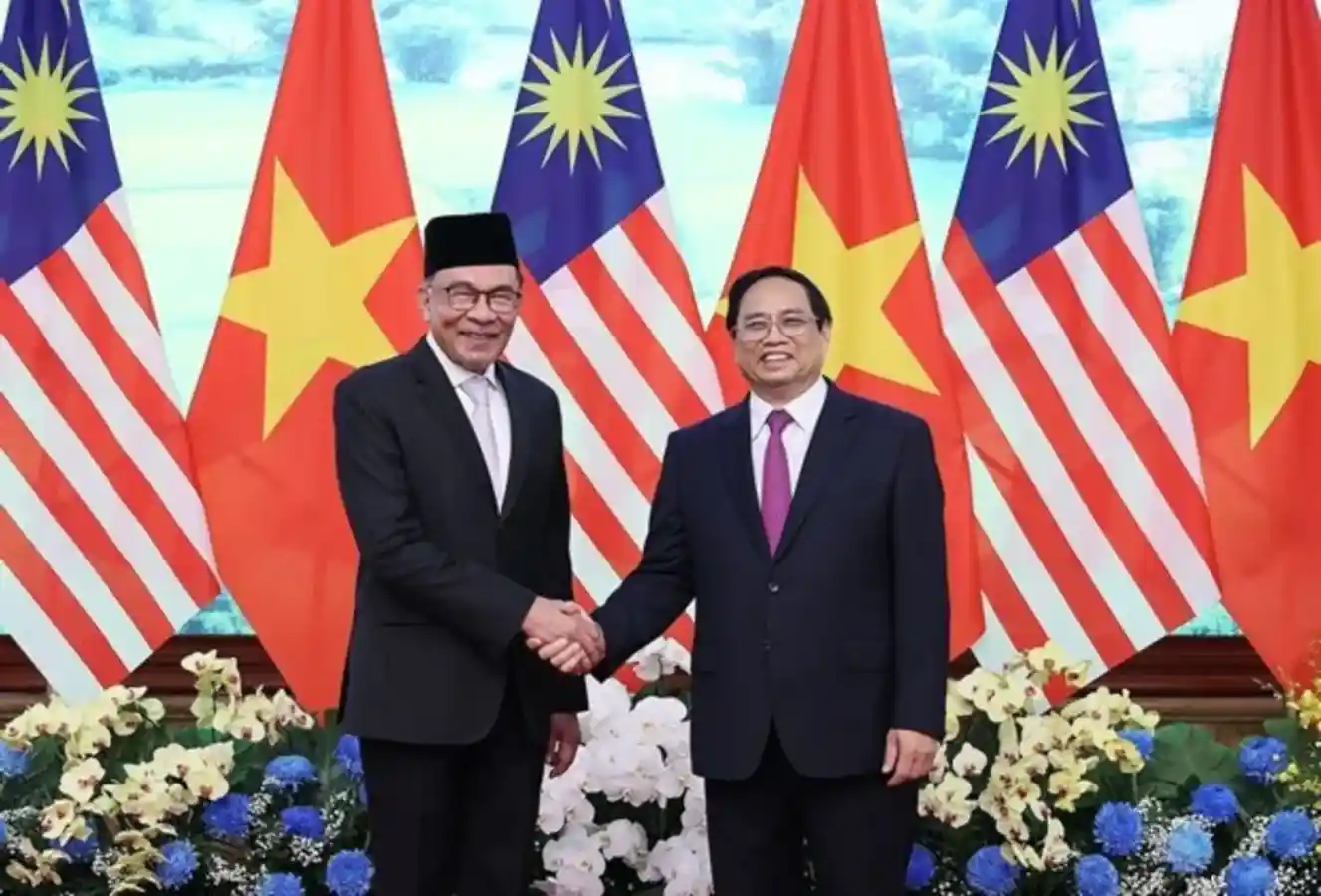In a significant step toward deepening regional cooperation, Vietnamese Prime Minister Phạm Minh Chính and his Malaysian counterpart Anwar Ibrahim concluded high-level talks on May 25, 2025, in Kuala Lumpur, unveiling a series of initiatives aimed at strengthening bilateral ties. The discussions, which culminated in a joint press conference, underscored a shared commitment to advancing their recently upgraded Comprehensive Strategic Partnership, with ambitious targets for trade, security, and regional stability within the ASEAN framework.
Building on a Historic Friendship
The talks highlighted the long-standing friendship between Vietnam and Malaysia, rooted in mutual respect and shared aspirations for development. Prime Minister Ibrahim expressed admiration for Vietnam’s historical struggle for independence and its ongoing efforts toward national progress. He voiced optimism about the future of their relationship, predicting robust growth in key areas such as trade, investment, tourism, agriculture, education, and maritime cooperation. “Our ties are poised for a transformative phase” he said during the press conference, emphasizing the importance of joint efforts to address common challenges.
Prime Minister Chính echoed this sentiment, describing the discussions as a reflection of mutual understanding and a determination to deepen ties in a comprehensive and effective manner. The leaders agreed to finalize an action program for the 2025-2030 period to guide collaboration, alongside establishing a mechanism for regular high-level meetings. This framework aims to ensure that political commitments translate into tangible outcomes, reinforcing the strategic partnership.
Economic Cooperation Takes Center Stage
A cornerstone of the talks was the focus on economic, trade, and investment cooperation, which both leaders identified as a highlight of bilateral relations. Two-way trade between Vietnam and Malaysia reached US$14.2 billion in 2024, with Malaysia ranking among the top 10 foreign investors in Vietnam, boasting a total registered capital exceeding US$13 billion. Building on this foundation, the leaders set an ambitious target of US$20 billion in bilateral trade by 2030, emphasizing a balanced approach to minimize trade barriers and facilitate the exchange of key products like agricultural goods, aquatic products, electronics, and construction materials.
Beyond traditional trade, the two nations agreed to expand cooperation in emerging fields such as the digital economy, circular economy, and green economy. This forward-thinking approach reflects a shared recognition of the need to adapt to global economic trends and sustainability challenges. Specific initiatives include enhancing agricultural and food production, as well as Halal product manufacturing, which aligns with Malaysia’s expertise and market demand. Additionally, both sides committed to fostering tourism, cultural exchanges, and people-to-people connections to strengthen social ties.
Security and Maritime Collaboration
Defense and security emerged as critical areas of focus during the talks, with both leaders pledging to contribute to peace and stability in their respective countries and the broader Southeast Asian region. Agreements were reached to enhance cooperation between naval, air force, and coast guard forces, as well as to combat terrorism and transnational crimes. A key emphasis was placed on preventing any individual or organization from using one country’s territory to undermine the other, signaling a zero-tolerance stance on such activities.
Maritime and ocean cooperation also featured prominently, with the leaders agreeing to explore a consultation mechanism on maritime issues and establish a hotline to address illegal, unreported, and unregulated (IUU) fishing. This initiative is particularly significant for Vietnam, which seeks Malaysia’s support in lifting the European Commission’s ‘yellow card’ warning on its fisheries sector. Furthermore, both prime ministers reiterated their commitment to advancing negotiations for a substantive and effective Code of Conduct (COC) in the East Sea, internationally known as the South China Sea, grounded in international law, particularly the 1982 United Nations Convention on the Law of the Sea (UNCLOS).
Regional Ambitions and ASEAN’s Role
The talks extended beyond bilateral concerns to address broader regional dynamics, particularly within the ASEAN framework. Prime Minister Chính expressed Vietnam’s high regard for Malaysia’s upcoming role as ASEAN Chair in 2025, commending its efforts to promote the bloc’s centrality and cohesion amid global uncertainties. He voiced confidence in Malaysia’s ability to host the 46th ASEAN Summit and related events, such as ASEAN-Gulf Cooperation Council and ASEAN-China meetings, which are expected to expand cooperation for peace, stability, and development across the region and beyond.
A notable proposal from Vietnam was the development of an electricity network connecting Vietnam, Malaysia, and other Southeast Asian countries. While details remain under discussion, this initiative could mark a significant step toward regional energy integration, fostering economic connectivity and resilience. Prime Minister Chính emphasized Vietnam’s broader vision of linking economies, businesses, people, and infrastructure within ASEAN to ensure sustainable development, social equity, and regional stability.
Concrete Steps and Symbolic Gestures
The visit was marked by the signing of several key cooperation documents, symbolizing the commitment to actionable outcomes. Among them was a Memorandum of Understanding (MoU) between Vietnam Electricity (EVN) and Malaysia’s Tenaga Nasional Berhad (TNB), aimed at enhancing energy collaboration. Additionally, two letters of intent were signed between the National University of Malaysia and Vietnam’s National Universities in Hanoi and Ho Chi Minh City, paving the way for academic and research partnerships.
Prime Minister Chính also took the opportunity to meet with prominent Malaysian parliamentary figures, including Awang Bemee Awang Ali Basah, President of the Dewan Negara (upper house), and Tan Sri Dato’ Johari Bin Abdul, Speaker of the Dewan Rakyat (lower house). These engagements underscored the importance of parliamentary diplomacy in reinforcing bilateral ties. Furthermore, Chính expressed appreciation for Malaysia’s support of the Vietnamese community in the country and its recognition of the Malaysia-Vietnam Friendship Association (MVFA), highlighting the role of community ties in strengthening relations.
Challenges and Opportunities Ahead
While the outcomes of the talks are promising, challenges remain in translating agreements into measurable results. Trade imbalances, regulatory hurdles, and differing national priorities could pose obstacles to achieving the US$20 billion trade target by 2030. Similarly, maritime cooperation, particularly in the contentious South China Sea, will require sustained diplomatic efforts to balance national interests with regional stability. If successful, however, the proposed consultation mechanisms and hotline on IUU fishing could serve as models for other ASEAN member states grappling with similar issues.
Analysts suggest that the emphasis on digital and green economies could position Vietnam and Malaysia as leaders in sustainable development within the region. Yet, the success of these initiatives will depend on robust policy frameworks and private-sector engagement. For Vietnam, Malaysia’s support in areas like Halal product manufacturing and fisheries regulation could open new markets and address long-standing trade challenges, provided implementation is prioritized.
A Partnership with Global Implications
The upgraded Comprehensive Strategic Partnership between Vietnam and Malaysia carries implications beyond their borders, reflecting a broader trend of ASEAN countries deepening intra-regional ties to counterbalance global uncertainties. As Malaysia prepares to assume the ASEAN Chairmanship in 2025, its collaboration with Vietnam could shape the bloc’s agenda on critical issues like energy security, maritime governance, and economic integration. For Vietnam, the partnership offers an opportunity to amplify its voice within ASEAN while leveraging Malaysia’s expertise and regional influence.
Public sentiment in both countries appears largely positive, with social media reactions on platforms like X highlighting optimism about enhanced trade and cultural exchanges. However, some voices caution against over-optimism, pointing to past delays in implementing bilateral agreements. As one user noted, “Promises are easy; delivery is the real test” reflecting a broader call for accountability.
As Vietnam and Malaysia embark on this new chapter of cooperation, questions linger about how their ambitious plans will unfold amidst regional and global challenges. Their ability to turn political will into concrete progress—whether through trade milestones, security frameworks, or regional energy projects—will be closely watched, not just by their citizens, but by the wider ASEAN community seeking models of effective partnership.















